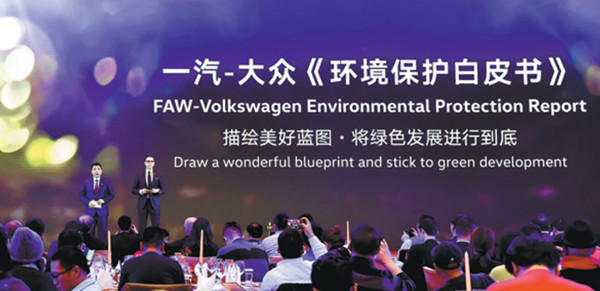FAW-Volkswagen pushes ahead with sustainable development plan
 |
|
FAW-Volkswagen launches an environmental protection report on Jan 18 in Beijing. [Photo provided to China Daily] |
With efforts made in green and sustainable development, and achievements in promoting electrification, intelligence, connectivity and sharing, FAW-Volkswagen Automotive Co is poised to "drive the future" and ride out the current downward spiral in the Chinese automobile market.
The Sino-German joint venture, headquartered in Changchun, capital of Northeast China's Jilin province, has established an all-around sustainable development scheme, covering energy conservation in production and operation, emissions reduction in production and logistics as well as cooperation with dealers and suppliers in environmental protection.
In terms of product development, the automaker is using 1.2-liter TSI engines and has launched a series of advanced technologies and systems, including an accurate mileage management system, a humanized low-power management system and iBooster energy recovery technology, in a bid to reduce energy consumption and emissions.
Attaching great importance to energy conservation and emissions reduction during the manufacturing process, FAW-VW initiated an new energy management system in 2018.
By analyzing energy saving on utilities, reducing the consumption of natural gas in drying furnaces and monitoring the energy consumption in painting workshops, the energy management system helps the automaker effectively reduce energy consumption, according to FAW-VW.
Joining hands with its dealers and suppliers, FAW-VW is eager to build a green industrial chain. The automaker has completed environmental protection reviews on more than 1,300 dealers and 50 suppliers nationwide, which has helped promote environmental protection among its partners, according to the automaker.
This year, FAW-VW is scheduled to launch a new environmental protection initiative, which covers automobile pollution prevention and control, battery recycling, in-car environmental health technology and the popularization of automobile environmental protection knowledge.
According to the carmaker, the initiative will also pay attention to energy saving and emissions reduction in the new energy vehicle sector, playing its part in promoting the development of China's new energy vehicles and environmental protection technologies.
The domestic car market is suffering from negative growth, while the trend for electrification, intelligence, connectivity and sharing is sweeping the entire automobile industry. In this context, seizing the strategic opportunity to achieve upgrading and development has become a common issue for all players, according to executives with FAWVW.
As a milestone of FAW-VW's development in the new energy vehicle industry, its MEB plant in Foshan, South China's Guangdong province has been completely renovated. Scheduled to come into service this year, the Foshan plant has a capacity to produce 600,000 new energy vehicles per year.
FAW-VW launched a series of electric models in 2019, marking a new chapter in the automaker's electrification strategy in the world's largest new energy vehicle market. The models are the e-Golf, e-Bora, Audi e-tron and Audi Q2L e-tron.
To further meet consumer demand, the e-Golf and e-Bora hit the market in October 2019. As pioneer models of FAW-VW's "e-era", they not only inherit the excellent handling and stylish design of the Volkswagen brand, but are also equipped with advanced battery, motor and electronic control systems and intelligent devices.
As the first product of the Audi brand to fully launch its electrification strategy, e-tron is a market leader in luxury c-class electric sport utility vehicles.
It combines sportiness with practicality, while fully meeting customer demand for luxury. Audi is scheduled to further amplify its electric product portfolio, with a goal of launching 30 new energy models worldwide by 2025.




 Mail
Mail Print
Print Larger
Larger
